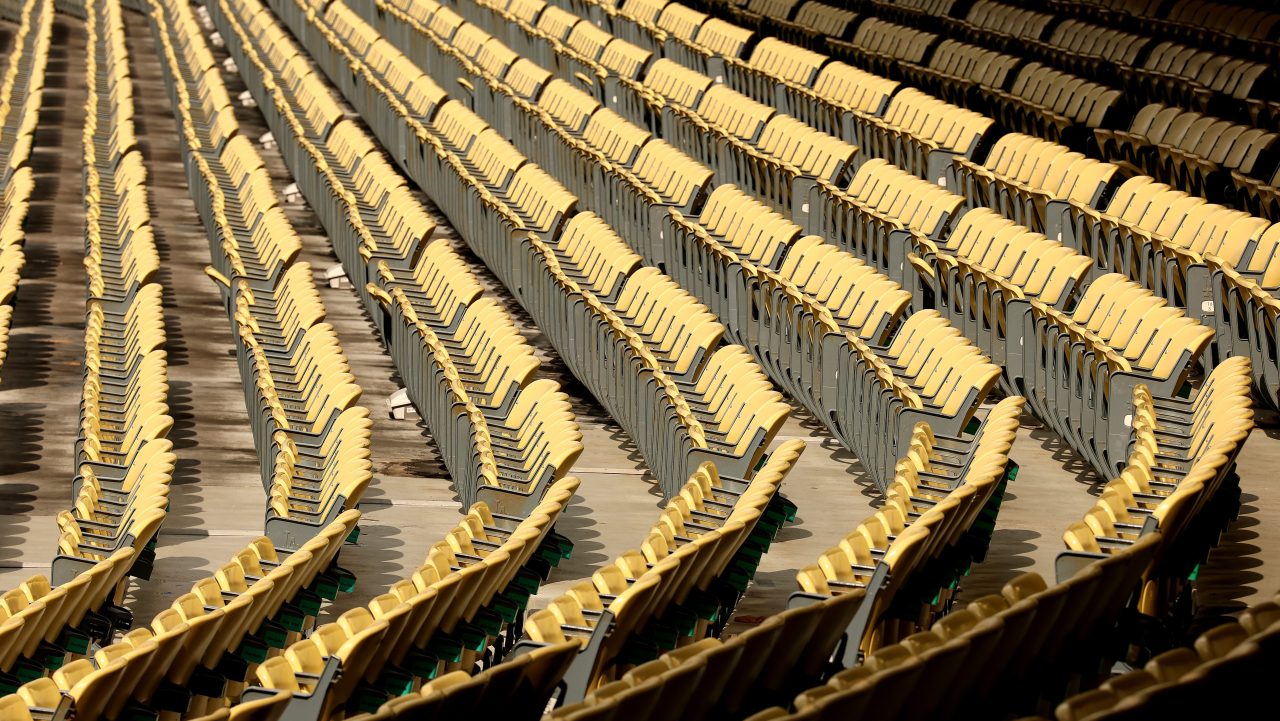

Thursday’s market-wide selloff in the wake of Donald Trump’s tariffs announcement will have wide-ranging impacts for sports teams, their fans and their owners. But regarding the most basic lifeblood of the industry—people paying money to see live entertainment—one stock in particular shows the market’s current concerns.
Ticket marketplace Vivid Seats (Nasdaq: SEAT) was down as much as 10% is the first few hours of Thursday trading, and finished the day down 9.64% at $2.76 a share. It’s close to an all-time low for the company, which went public via a SPAC deal in late 2021.
Vivid is one of the many stocks falling not because its imports face new, elevated tariffs, but rather because of concerns that a wider economic slowdown—further inflation, recession, etc.—could reduce discretionary spending by Americans. And sports is a major beneficiary of non-essential consumer spending.
There is evidence, however, that sports teams can weather market-wide economic downturns. Many investors turn to sports specifically because the assets are relatively uncorrelated to the broader market. During both the Great Recession of 2008 and the more recent COVID-19 pandemic, franchise valuations continued their upward growth.
“To show you how special these assets are, there were seven control sales done during the Great Recession, and six of them were for record prices,” sports banker Sal Galatioto said last month on the Sporticast podcast. “What other asset class can you say that about in highly distressed economic times? You can’t.”

Vivid Seats is a relatively small public company, even by sports standards. Its current market cap is about $587 million, as compared to $84 billion for Nike, $15.6 billion for DraftKings and $1.2 billion for Topgolf Callaway, to name a few other sports stocks that fell on Thursday. That said, Vivid’s entire business is inextricably linked to demand for live events, either as a resale marketplace or as a broker. The first item listed in the risks section of its most recent 10-K filing is, “We are adversely affected by decreases in the supply of and/or demand for live concert, sporting and theater events.”
The company reported $775 million in revenue last year. Its broker work accounted for just 16% of that total, or $127.7 million. The other 84%, or $648 million, was from its marketplace unit, serving as an intermediary between ticket buyers and sellers.
Sports represented 31% of that $648 million, according to the filing, or $202.2 million. Concerts were the biggest segment at 43% ($283.2 million), while theater was a distant third at 21% ($137.7 million). Year-over-year, sports revenue grew 1%, while concert revenue fell 8%.
The new tariffs threaten to buck a strong tailwind for in-person sporting attendance. In its annual “global sports outlook,” published in December, Fitch highlighted demand for live events as an improving metric. It also referenced price changes as a response to inflation in 2024.
“In the current landscape, [contractually obligated income] is expected to improve as sports remain a favored leisure activity and a popular venue for live entertainment,” the Fitch report said. “The strong demand for premium seating, along with the repricing of expired contracts after a high inflationary period, is expected to positively impact [contractually obligated income] renewals.”
U.S. leagues also vary widely in their financial reliance on live events. Only 17% of NFL revenue is money that teams keep from ticket sales, according to Sportico’s accounting. That grows to 26% in the NBA, 31% in MLB, 39% in MLS and 44% in NHL.
Stocks tied directly to sports team ownership saw smaller dips than Vivid Seats. Atlanta Braves Holdings (Nasdaq: BATRA) was down 3% as of noon ET and closed down 2.45% at $43.32. MSG Sports (NYSE: MSGS), which holds the New York Rangers and New York Knicks, finished the day down about 3% at $193.35.
(This story has been updated with closing stock prices.)
